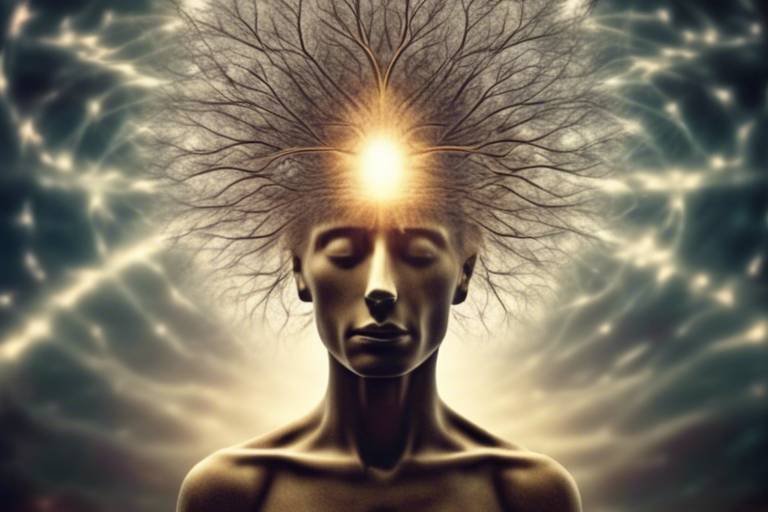The Principle of Causality in Metaphysics - An Overview
The principle of causality is a cornerstone of metaphysical inquiry, acting as a bridge between our understanding of reality and the intricate relationships that govern existence. At its core, causality addresses the fundamental question: What makes things happen? This concept is not merely an abstract idea confined to philosophical discussions; it plays a crucial role in our everyday lives, shaping the way we interpret events and phenomena around us. Imagine a world where every action leads to a reaction, where every event is linked to a cause. This interconnectedness is what makes the study of causality so fascinating and essential.
Throughout history, thinkers have grappled with the implications of causality, recognizing its significance in various fields such as science, philosophy, and even ethics. The exploration of this principle invites us to ponder profound questions about existence. For instance, if every effect has a cause, what does that imply about free will? Are our choices merely the results of preceding events, or do we possess genuine autonomy? Such inquiries not only enrich our understanding of metaphysics but also challenge us to consider our place within the cosmos.
Moreover, the principle of causality serves as a lens through which we can examine the nature of relationships between events and entities. In a world governed by laws of cause and effect, understanding these relationships becomes paramount. Whether it's the cause of a natural disaster, the influence of social dynamics on human behavior, or the ripple effects of technological advancements, the principle of causality permeates every aspect of our lives. Thus, as we delve deeper into this topic, we uncover layers of meaning that extend beyond mere philosophical musings.
As we embark on this journey through the historical significance and contemporary interpretations of causality, we will uncover how this principle has evolved and adapted to new scientific discoveries and philosophical debates. From ancient philosophers who laid the groundwork to modern thinkers who challenge traditional notions, the exploration of causality remains a vibrant field of inquiry. Join us as we unravel the complexities of causality in metaphysics, a journey that promises to illuminate our understanding of reality itself.
- What is the principle of causality? The principle of causality states that every effect has a specific cause, establishing a relationship between events and phenomena.
- Why is causality important in metaphysics? Causality helps us understand the nature of reality, existence, and the interconnectedness of events, influencing various fields including philosophy and science.
- How has the concept of causality evolved over time? From ancient philosophers like Aristotle to modern thinkers such as Hume and Einstein, the concept of causality has undergone significant changes, adapting to new scientific insights and philosophical debates.

Historical Background of Causality
The concept of causality has a rich and intricate history that stretches back to ancient civilizations. Early thinkers, such as the Greeks, laid the groundwork for understanding the relationship between cause and effect. In particular, philosophers like Aristotle offered a systematic approach to causation, which would influence Western thought for centuries to come. Aristotle proposed a framework of four causes that explained not just what something is, but also why it exists. This multifaceted perspective emphasized that causality is not merely about linear sequences but involves various dimensions that contribute to the existence of an object or event.
As we moved into the Middle Ages, the integration of Aristotelian thought with religious doctrine further complicated the understanding of causality. Scholars like Aquinas sought to reconcile faith with reason, suggesting that divine intervention played a crucial role in the causal chain of events. This period highlighted the tension between naturalistic explanations and those rooted in theological beliefs. The debate around causality became a battleground for different epistemological views, shaping how future generations would approach the subject.
Fast forward to the Enlightenment, where thinkers like David Hume brought a skeptical lens to causality. Hume famously argued that our understanding of cause and effect is not derived from reason but rather from habit and experience. His assertion that we cannot perceive causation directly but only infer it from repeated observations shook the foundations of metaphysics and paved the way for modern empiricism. Hume's skepticism forced philosophers to reconsider the nature of reality and the limitations of human understanding, leading to profound implications for epistemology and metaphysics.
In the 19th century, the advent of scientific inquiry introduced new layers to the discussion of causality. The development of the scientific method allowed for more rigorous testing of causal relationships, particularly in the fields of physics and biology. The rise of determinism suggested that all events, including human actions, could be traced back to prior causes, further complicating the discourse on free will and moral responsibility. This era marked a significant shift, as causality began to be viewed not just philosophically but also through the lens of empirical evidence.
As we entered the 20th century, the exploration of causality took on new dimensions with the introduction of quantum mechanics and relativity. These scientific advancements challenged classical notions of causation, suggesting that at subatomic levels, events do not follow a straightforward cause-and-effect relationship. The implications of these theories have sparked ongoing debates among philosophers and scientists alike, as they grapple with the complexities of causality in a universe that appears to be far more intricate than previously imagined.
In summary, the historical development of the concept of causality is a tapestry woven from the contributions of various thinkers across different eras. From Aristotle’s foundational ideas to Hume’s skepticism and the modern scientific challenges, our understanding of causality continues to evolve. This rich history not only informs our metaphysical inquiries but also shapes our perceptions of reality and existence.

Key Philosophers and Their Contributions
The concept of causality has been a cornerstone of metaphysical inquiry, and over the centuries, several key philosophers have profoundly shaped our understanding of this principle. Each thinker has contributed unique perspectives, prompting us to rethink not just causation but also our broader understanding of reality itself. Among these philosophers, Aristotle, David Hume, and Immanuel Kant stand out for their significant contributions.
Aristotle, often regarded as the father of Western philosophy, laid the groundwork for many philosophical discussions on causation. His exploration of the four causes—material, formal, efficient, and final—offers a multi-faceted approach to understanding how and why things happen. For Aristotle, causation is not merely about a linear sequence of events; it encompasses the substance from which something is made (material cause), the form or essence of that thing (formal cause), the agent or force that brings it into being (efficient cause), and finally, the purpose or end for which it exists (final cause). This comprehensive framework invites us to consider not just the 'what' but the 'why' behind phenomena.
Moving forward in time, David Hume introduced a more skeptical view of causality. He argued that our perception of cause and effect is not grounded in logical necessity but rather in habit and experience. According to Hume, we observe events occurring in conjunction and begin to associate them through repetition. This raises a provocative question: if causation is merely a product of our experiences, how can we claim to know anything about the universe's underlying structure? His ideas have profound implications for epistemology, challenging us to reconsider the foundations of our knowledge and the assumptions we make about the world.
Next in line is Immanuel Kant, who sought to bridge the gap between rationalism and empiricism. Kant introduced the idea that causality is a necessary condition for human experience. He posited that while we can never know things as they are in themselves (the noumenal world), our understanding of the phenomenal world is structured by concepts like causality. For Kant, causation is not merely an external relationship but a fundamental aspect of our cognitive framework, shaping how we perceive and interpret our experiences. This perspective invites us to ponder whether causality is an inherent feature of reality or a construct of our understanding.
In summary, the contributions of these philosophers have laid a rich foundation for contemporary discussions on causality. Their diverse perspectives encourage us to explore causation from multiple angles, prompting deeper inquiries into existence, reality, and the interconnectedness of events. As we navigate through modern metaphysical discussions, these historical insights remain vital, reminding us that the quest for understanding causality is as much about our perceptions and interpretations as it is about the events themselves.
- What is the principle of causality? The principle of causality states that every effect has a cause, suggesting a relationship between events where one event leads to another.
- Why is causality important in philosophy? Causality is crucial in philosophy as it helps us understand the nature of reality, existence, and the relationships between different phenomena.
- How did Aristotle contribute to the understanding of causality? Aristotle introduced the four causes, providing a comprehensive framework that encompasses material, formal, efficient, and final causes to explain phenomena.
- What was Hume's view on causality? Hume argued that our understanding of causation is based on habit and experience rather than logical necessity, challenging traditional views of cause and effect.
- How does Kant's perspective differ from that of Hume? Kant believed that causality is a necessary condition for human experience, shaping our understanding of the world, while Hume viewed it as a product of habit and observation.

Aristotle's Causal Framework
Aristotle, one of the towering figures of ancient philosophy, developed a nuanced understanding of causality that remains influential to this day. His framework consists of four distinct types of causes: material, formal, efficient, and final. Each of these causes plays a vital role in explaining why things exist and how they come to be. Imagine trying to assemble a puzzle; each piece represents a different aspect of causation, and only when they come together can you see the complete picture.
The material cause refers to the substance or matter that constitutes an object. For instance, if we consider a wooden table, the wood itself is its material cause. This perspective emphasizes how the physical properties of an object contribute to its identity and function. Without the right material, the table would not exist as we know it. It's like baking a cake; without flour, you simply cannot have cake!
Moving on to the formal cause, this aspect pertains to the design or essence of an object. It’s the blueprint that gives shape to the material. In our table example, the formal cause would be the design that dictates its structure—how many legs it has, its height, and its overall aesthetic. This cause is crucial because it transforms mere matter into something functional and meaningful.
Next, we have the efficient cause, which is all about the agent or force that brings something into being. In the case of our table, the efficient cause would be the carpenter who crafted it. Without the carpenter's skills and actions, the table would remain just a pile of wood. This cause highlights the importance of agency and action in the process of creation.
Finally, the final cause represents the purpose or end for which an object exists. Why does our table exist? Perhaps it’s meant for dining, studying, or holding decorative items. This cause emphasizes intentions and goals, both in nature and human actions. Understanding the final cause allows us to appreciate not just the object itself but also its role in the broader context of life.
In summary, Aristotle's four causes provide a comprehensive framework for understanding causation. Each cause answers a different question about an object or event, creating a multifaceted view of reality. Just as you wouldn't want to solve a mystery with only half the clues, grasping all four causes gives us a richer understanding of the world around us. In contemporary discussions, these principles continue to resonate, inviting us to consider how purpose and form influence our understanding of existence.
- What are Aristotle's four causes? - Aristotle identified four types of causes: material, formal, efficient, and final, each explaining different aspects of why things exist.
- How does the material cause differ from the final cause? - The material cause refers to the substance of an object, while the final cause pertains to its purpose or intended use.
- Why is Aristotle's framework still relevant today? - Aristotle's causal framework helps us understand complex relationships in various fields, from philosophy to science, illustrating the interconnectedness of existence.

Material Cause
The concept of is a cornerstone of Aristotle's philosophy, representing the substance or matter that constitutes an object or event. To put it simply, if you think of a sculpture, the material cause is the marble or clay from which the sculpture is crafted. This aspect emphasizes how the physical properties of materials contribute significantly to the identity and characteristics of the object. For instance, consider the difference between a wooden chair and a metal chair; their materials not only dictate their appearance but also their durability, comfort, and even the environment in which they are best used.
Understanding material cause goes beyond mere physical attributes. It invites us to explore how different materials can influence the functionality and purpose of objects. For example, a glass bottle and a plastic bottle serve the same basic function—holding liquids—but their material differences affect their recycling processes, environmental impact, and even the perception of quality by consumers. This brings us to a critical realization: the material cause isn't just about what something is made of; it's also about the implications of those materials in our lives and the broader ecosystem.
Moreover, the idea of material cause can extend into various fields, including art, engineering, and even metaphysics. In art, the choice of material can profoundly affect the emotional response of the viewer. In engineering, the selection of materials can determine the success or failure of a project. Each choice reflects a deeper understanding of how material properties interact with design and function. This interplay is crucial when we consider the causal relationships that govern our reality. For instance, the material cause of a bridge not only involves the steel and concrete used but also the engineering principles that dictate how those materials will bear weight and withstand environmental stresses.
In summary, the material cause is a fundamental aspect of understanding causation. It challenges us to look beyond the surface and consider how the essence of an object—its material composition—shapes its existence and purpose in the world. By recognizing the role of material cause, we can gain a more profound appreciation for the interconnectedness of all things and how they contribute to the larger tapestry of reality.
- What is material cause? Material cause refers to the substance or matter from which something is made, emphasizing the importance of physical properties in understanding objects and events.
- How does material cause relate to other types of causes? Material cause is one of Aristotle's four causes, alongside formal, efficient, and final causes, which together provide a comprehensive framework for understanding causation.
- Can material cause influence human actions? Yes, the materials we choose for our creations can affect our intentions and the outcomes of our actions, highlighting the significance of material cause in both nature and human behavior.

Final Cause
The is a captivating concept that delves into the purpose or end for which an object exists. Imagine you’re building a treehouse; the final cause isn’t just the wood and nails you use, but the joy and memories that will come from playing in it. This perspective emphasizes that understanding causality is not merely about the mechanics of how things happen, but also about why they exist in the first place. Aristotle pointed out that everything in nature has a purpose, and recognizing this purpose can profoundly influence our understanding of causation.
When we analyze the final cause, we often find ourselves asking questions that probe deeper into the essence of existence. Consider the following:
- What is the ultimate goal of a living organism?
- How do human intentions shape the outcomes of our actions?
- Can we attribute a final cause to abstract concepts, like justice or love?
In practical terms, the final cause can be observed in various domains, from biology to ethics. For instance, in biology, the final cause of an organism's features might be survival and reproduction. In ethics, the final cause of human actions could be the pursuit of happiness or the fulfillment of moral duties. This layered understanding of causality opens up discussions about the interplay between intention and action, suggesting that our goals can significantly influence the paths we take and the outcomes we achieve.
Moreover, the concept of final cause invites us to reflect on the broader implications of our actions in the universe. Are we mere players in a deterministic game, or do our intentions and purposes play a role in shaping reality? This question resonates deeply in both philosophical and scientific discussions, prompting us to consider how purpose interweaves with the fabric of existence.
In conclusion, the final cause is not just a philosophical abstraction; it is a lens through which we can examine our lives and the world around us. By understanding the purposes behind actions and events, we can gain a richer perspective on causality and its significance in our daily lives.
- What is a final cause? A final cause refers to the purpose or goal for which something exists or is done.
- How does the final cause differ from other types of causes? Unlike material or efficient causes, which focus on the substance or mechanism of an event, the final cause emphasizes the intended outcome or purpose.
- Can final causes apply to abstract concepts? Yes, final causes can be applied to abstract concepts, such as societal values or ethical principles, by examining the purposes they serve.

Hume's Skeptical Approach
David Hume, a pivotal figure in the realm of philosophy, took a skeptical approach to the principle of causality that challenged the very foundations of how we perceive cause and effect. Unlike his predecessors, Hume argued that our understanding of causation is not derived from any inherent logical necessity but rather from habit and experience. This perspective was revolutionary, as it suggested that what we often take for granted—our ability to predict one event based on another—is more about our psychological conditioning than an objective reality.
In Hume's view, when we observe a sequence of events, we tend to assume that there is a causal link between them. For example, if we see a ball rolling down a hill after being struck, we instinctively conclude that the strike caused the ball to move. However, Hume posited that this conclusion is not a product of rational deduction but rather a habit of thought formed through repeated observations. This raises a profound question: if our understanding of causality is merely a product of habit, can we ever truly know the nature of causation?
To illustrate Hume's skepticism further, he presented several key arguments:
- Inductive Reasoning: Hume pointed out that inductive reasoning, which is the basis for most scientific inquiry, is itself not logically justified. Just because the sun has risen every day of our lives does not guarantee it will rise tomorrow.
- Custom and Habit: He emphasized that our belief in causation stems from our psychological tendencies rather than any rational proof. We are conditioned to expect certain outcomes based on past experiences.
- Problem of Induction: Hume famously articulated the "problem of induction," questioning how we can justify our beliefs about the future based on past events.
Hume's skepticism has profound implications for epistemology—the study of knowledge. If our understanding of causality is fundamentally flawed, then how can we claim to have knowledge about the world? This perspective invites a deeper inquiry into the nature of reality itself, as it suggests that our perceptions may not accurately reflect the underlying truths of existence.
In contemporary discussions, Hume's ideas continue to resonate, especially in light of modern scientific discoveries that challenge traditional notions of causation. For instance, the principles of quantum mechanics and the complexities of relativity have led to a reevaluation of how we understand causal relationships. Hume's skepticism serves as a reminder that our quest for knowledge is fraught with uncertainty, urging us to remain open-minded and critical of our assumptions.
- What is Hume's main argument regarding causation?
Hume argues that our understanding of causation is based on habit and experience rather than logical necessity. - How does Hume's skepticism impact modern philosophy?
Hume's skepticism challenges the validity of inductive reasoning, prompting deeper inquiries into the nature of knowledge and reality. - What are the implications of Hume's ideas for scientific inquiry?
Hume's thoughts highlight the limitations of scientific predictions based on past experiences, urging caution in our assumptions about causality.

Modern Interpretations of Causality
In the contemporary landscape of metaphysics, the principle of causality has undergone a significant transformation, influenced largely by advancements in science and philosophy. Gone are the days when causation was merely about straightforward cause-and-effect relationships; today, we find ourselves navigating a complex web of interactions that challenge our traditional understanding. With the advent of quantum mechanics and theory of relativity, the very fabric of causation has been reexamined, leading to exciting yet perplexing interpretations that invite us to rethink how we perceive reality.
One of the most striking shifts in our understanding of causality comes from the field of quantum mechanics. At the quantum level, particles behave in ways that defy classical logic. For instance, the phenomenon of quantum entanglement suggests that particles can be interconnected in such a way that the state of one particle instantly influences another, regardless of the distance between them. This challenges the classical notion of locality, where an object is only influenced by its immediate surroundings. Imagine two dancers performing a synchronized routine, but instead of being on the same stage, they are miles apart—yet their movements are perfectly in sync. This bizarre reality forces us to reconsider what we mean by causation, as the traditional idea of a direct cause leading to an effect seems inadequate in explaining these interactions.
Furthermore, the principle of superposition in quantum mechanics introduces another layer of complexity. In this context, particles can exist in multiple states simultaneously until observed. This raises profound questions about the role of the observer in the causal chain. Are we merely passive observers, or do we actively shape reality through our observations? This idea can be likened to a painter who, until they put brush to canvas, holds the potential for countless masterpieces within their mind. In essence, the act of observing collapses the possibilities into a single outcome, blurring the lines of causality in a way that has never been considered before.
On the other hand, Einstein's theory of relativity has revolutionized our understanding of time and space, leading to a reevaluation of causal relationships. According to relativity, the concept of simultaneity is relative—what one observer perceives as simultaneous may not be the same for another in a different frame of reference. This challenges our intuitive grasp of causation, as it introduces the possibility that events can be perceived as causal from one perspective but not from another. To illustrate, consider two lightning strikes that occur simultaneously from one person's viewpoint but are observed at different times by another due to their differing locations. This scenario compels us to question the very nature of causality: Is it absolute, or is it contingent upon our perspective?
As we delve deeper into these modern interpretations, it becomes clear that causality is not a simple, linear pathway but rather a complex interplay of relationships that can be influenced by various factors. The implications of these insights extend beyond physics and into the realms of philosophy, ethics, and even our understanding of free will. If causation can be so fluid and multifaceted, what does that mean for our accountability in actions? Are we merely players in a cosmic play, or do we possess agency in shaping our destinies?
In summary, the modern interpretations of causality challenge us to rethink our foundational beliefs about how the universe operates. With quantum mechanics and relativity at the forefront, we are invited to explore a world where causation is not just a straightforward chain of events but a rich tapestry of interactions shaped by observation, perspective, and the very fabric of reality itself. As we continue to unravel these complexities, the quest for understanding causality remains one of the most fascinating journeys in metaphysical inquiry.
- What is causality in metaphysics?
Causality in metaphysics refers to the relationship between cause and effect, exploring how events influence one another and the underlying principles that govern these interactions. - How has modern science influenced our understanding of causality?
Advancements in quantum mechanics and relativity have introduced complexities that challenge traditional notions of causation, suggesting that relationships can be non-linear and context-dependent. - What is quantum entanglement?
Quantum entanglement is a phenomenon where particles become interconnected in such a way that the state of one particle instantaneously affects the state of another, regardless of distance. - How does relativity change our perception of time and causation?
Einstein's theory of relativity shows that simultaneity is relative, meaning that events perceived as simultaneous by one observer may not be perceived the same way by another, complicating causal relationships.

Causality in Quantum Mechanics
Causality in quantum mechanics is a fascinating and complex topic that challenges our traditional understanding of cause and effect. In classical physics, causality is relatively straightforward: an event A causes event B, and this relationship is predictable and consistent. However, when we dive into the quantum realm, things get a bit murky. Imagine trying to catch a slippery fish in a stream; just when you think you've got it, it slips away, much like how particles behave in quantum mechanics.
One of the most intriguing aspects of quantum mechanics is the concept of entanglement. When two particles become entangled, the state of one particle is instantly correlated with the state of another, regardless of the distance separating them. This phenomenon leads to what Einstein famously referred to as "spooky action at a distance." It raises profound questions about causality: if two particles are entangled, can we really say that one particle causes the other to change state, or is this relationship more about correlation than direct causation?
Another mind-bending concept is superposition. In quantum mechanics, particles can exist in multiple states at once until they are observed or measured. This means that causality can seem to operate differently; the act of measurement itself influences the outcome. Think of it like a coin spinning in the air—it is both heads and tails until you catch it and see the result. This challenges the classical notion of a clear cause leading to a specific effect, as the outcome depends on the observer's interaction with the system.
To further illustrate these concepts, let's consider a simplified table that outlines some key differences between classical and quantum causality:
| Aspect | Classical Causality | Quantum Causality |
|---|---|---|
| Nature of Events | Deterministic | Probabilistic |
| Influence of Observation | None | Significant |
| Relationship Between Events | Clear cause-effect link | Correlation without direct causation |
| Distance | Local interactions | Non-local interactions (entanglement) |
These differences highlight how quantum mechanics not only reshapes our understanding of causality but also invites us to rethink the very fabric of reality. The implications are profound, suggesting that our universe may not operate on the straightforward principles we once assumed. As we continue to explore these ideas, we find ourselves at the intersection of science and philosophy, raising questions that challenge our fundamental beliefs about existence and the nature of the universe.
- What is quantum entanglement? Quantum entanglement is a phenomenon where two or more particles become connected in such a way that the state of one particle instantly influences the state of another, no matter the distance between them.
- How does superposition work? In quantum mechanics, superposition allows particles to exist in multiple states simultaneously until they are observed, at which point they collapse into one of the possible states.
- Does quantum mechanics imply that causality doesn't exist? Not necessarily. While quantum mechanics challenges traditional views of causality, it does not eliminate the concept entirely; instead, it suggests a more complex relationship between events.

Relativity and Causation
The theory of relativity, proposed by Albert Einstein, revolutionized our understanding of the universe in profound ways. It challenged the traditional notions of time and space, fundamentally altering how we perceive causation. In classical physics, causality often aligns neatly with a linear timeline—where cause precedes effect in a straightforward manner. However, relativity introduces a more complex interplay between time and space, suggesting that simultaneity is not absolute but rather relative to the observer's frame of reference.
Imagine you're at a train station, watching two trains pass by. If you’re standing still, you might see one train leaving the station while the other is approaching. Now, consider a passenger on one of those trains. To them, the perception of time and events is entirely different. This analogy illustrates how relativity reshapes our understanding of causation; what one observer sees as a cause and effect relationship might not hold true for another. This leads to the intriguing question: if causation can vary based on perspective, what does that mean for our understanding of reality itself?
One of the most significant implications of relativity for causation is the concept of light cones. A light cone represents the path that light, emanating from a single event, would take through spacetime. Events that fall within the light cone can influence each other, while those outside cannot. This creates a sort of causal structure that respects the finite speed of light, ensuring that no information or effect can travel faster than this cosmic speed limit. In this framework, the relationship between events becomes a matter of their positions within these cones, challenging the absolute nature of causality.
Furthermore, the implications of relativity extend to the philosophical discussions surrounding determinism and free will. If events are not fixed and can be perceived differently depending on the observer's position, can we still claim that the universe operates under strict deterministic laws? Or does this variability open the door to a more nuanced understanding of free will, where our choices are influenced by a multitude of factors, including our unique perspectives?
In conclusion, the intersection of relativity and causation invites us to rethink our metaphysical assumptions about the nature of reality. As we explore these concepts, we must grapple with the complexities they introduce, recognizing that our understanding of cause and effect is not as straightforward as it once seemed. The journey into the depths of causation through the lens of relativity is both bewildering and enlightening, urging us to keep questioning and exploring the fabric of existence itself.
- What is the principle of causality?
Causality refers to the relationship between cause and effect, where one event (the cause) leads to the occurrence of another event (the effect). - How does relativity affect our understanding of causation?
Relativity suggests that causation is not absolute; it can vary based on the observer's frame of reference, complicating traditional notions of cause and effect. - What are light cones?
Light cones are a concept in relativity that represent the paths of light emanating from an event, helping to define which events can influence each other. - Does relativity imply that free will exists?
Relativity's implications for causation raise questions about determinism and free will, suggesting that our choices may be influenced by multiple perspectives.

Implications for Metaphysical Inquiry
The principle of causality is not just a dry philosophical concept; it serves as a cornerstone for many debates in metaphysics and has profound implications for our understanding of reality. When we ponder the nature of existence, we often find ourselves grappling with questions about determinism and free will. Are our actions predetermined by a chain of prior events, or do we possess the autonomy to choose differently? This dichotomy is at the heart of metaphysical inquiry and fuels countless discussions among philosophers, scientists, and even theologians.
Consider this: if everything is causally determined, then what does that mean for our sense of self? Are we simply puppets dancing to the strings of fate? Or is there room for spontaneity in a universe governed by laws of cause and effect? These questions challenge us to rethink our assumptions about agency and responsibility. The implications are enormous, affecting everything from moral accountability to how we perceive our place in the cosmos.
Moreover, the principle of causality invites us to explore the nature of reality itself. If we accept that every event has a cause, we must then ask: what is the first cause? This inquiry leads us to the age-old question of the existence of a prime mover or an uncaused cause, a concept that has been debated since the days of Aristotle. Such questions encourage a deeper exploration of the universe, pushing the boundaries of what we understand about existence.
In contemporary discussions, the implications of causality extend into the realms of science and philosophy. For instance, the discoveries in quantum mechanics challenge classical causality, suggesting that events at the subatomic level may not adhere to our traditional understanding of cause and effect. This raises further questions about the reliability of our perceptions and whether our established notions of causality can withstand the scrutiny of scientific inquiry.
Ultimately, the implications of causality in metaphysical inquiry compel us to confront our beliefs about the universe. They urge us to consider how we interpret our experiences and the relationships we establish with the world around us. In this light, causality becomes not just a principle of philosophy but a lens through which we can examine the very fabric of reality.
- What is the principle of causality? The principle of causality states that every effect has a cause, which establishes a relationship between events and entities.
- How does causality relate to free will? The relationship between causality and free will is complex; it raises questions about whether our choices are predetermined or if we have the ability to choose freely.
- Who are the key philosophers associated with causality? Major philosophers include Aristotle, David Hume, and Immanuel Kant, each contributing unique perspectives on the nature of causation.
- How does quantum mechanics challenge traditional notions of causality? Quantum mechanics introduces concepts like entanglement and superposition, which complicate our understanding of cause and effect at the subatomic level.
- What is the significance of the first cause in metaphysics? The first cause is a philosophical concept that seeks to explain the origin of all things, prompting discussions about the existence of a prime mover or uncaused cause.
Frequently Asked Questions
- What is the principle of causality in metaphysics?
The principle of causality in metaphysics refers to the relationship between causes and effects, emphasizing that every event or phenomenon has a reason behind its occurrence. This concept helps us understand the connections between different entities and events, shaping our perception of reality.
- How has the concept of causality evolved throughout history?
The concept of causality has undergone significant evolution, starting from ancient philosophical discussions to modern metaphysical inquiries. Philosophers like Aristotle laid the groundwork with his four causes, while thinkers like Hume challenged traditional views, asserting that our understanding of causation is based more on experience than on logical necessity.
- What are Aristotle's four causes?
Aristotle's four causes include the material cause (the substance of an object), formal cause (the form or essence), efficient cause (the agent or process that brings something into being), and final cause (the purpose or goal of an object). Together, these causes provide a comprehensive framework for understanding causation.
- How does Hume's perspective on causation differ from traditional views?
Hume's perspective differs by suggesting that our understanding of causation is not based on inherent connections between events but rather on habits formed through repeated experiences. This skepticism raises questions about the certainty of our knowledge regarding cause and effect.
- What are modern interpretations of causality influenced by science?
Modern interpretations of causality have been influenced by scientific advancements, particularly in quantum mechanics and relativity. These fields introduce complex ideas such as entanglement and the relativity of simultaneity, challenging classical notions of how causation operates in the universe.
- How does quantum mechanics challenge traditional causality?
Quantum mechanics challenges traditional causality by introducing phenomena like entanglement, where particles can be interconnected regardless of distance, and superposition, where particles exist in multiple states simultaneously. These concepts complicate our understanding of linear cause and effect.
- What role does relativity play in our understanding of causation?
Einstein's theory of relativity reshapes our understanding of time and space, suggesting that simultaneity is relative to the observer's frame of reference. This has profound implications for causal relationships, as events that appear simultaneous in one frame may not be so in another.
- What implications does the principle of causality have for free will?
The principle of causality raises essential questions about determinism and free will. If every event is caused by preceding events, it challenges the notion of free will, inviting deeper inquiry into whether our actions are predetermined or if we have the agency to influence outcomes.



















